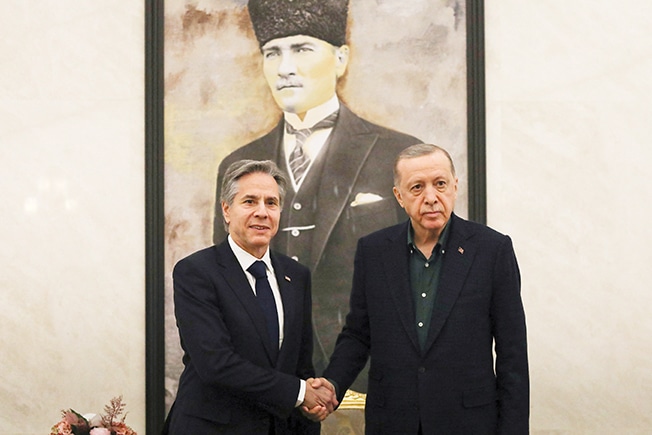U.S. Secretary of State Antony Blinken said during a trip to Turkey that Washington will help Turkey “for as long as it takes” after earthquakes rocked the country two weeks ago, as authorities carried out widescale demolitions of damaged buildings.
The United States has sent a search and rescue team to Turkey, along with medical supplies, concrete-breaking machinery and additional funding of $85 million in humanitarian aid that also covers Syria.
Turkish Foreign Minister Mevlut Cavusoglu said there was no need to wait for a disaster and difficult times to improve relations with the United States, speaking after talks with Blinken.
Cavusoglu, alongside Blinken, told a news conference that it was not possible for Turkey to buy U.S. F-16 warplanes with pre-conditions and that he believed the issue can be overcome if the U.S. administration maintains a decisive stance.
“The United States and Turkey do not agree on every issue but it is a partnership that has withstood against challenges,” Blinken told a joint news conference with Turkish Foreign Minister Mevlut Cavusoglu in Ankara.
Total U.S. humanitarian assistance to support the earthquake response in Turkey and Syria has reached $185 million, the U.S. State Department has said.
Relations between the NATO allies have been strained since 2019 when Ankara acquired Russian missile defense systems, among other sources of tension between them.
Cavusoglu told reporters he had discussed a planned $20 billion deal for U.S. F-16 warplanes with Blinken, and said that Turkey would like the U.S. administration to send the formal notification for the F-16s to Congress.
On Monday, rescue work wound down after the Feb. 6 earthquakes killed more than 46,000 people in southern Turkey and northwest Syria.
Turkey’s Disaster and Emergency Management Authority (AFAD) said that nearly 13,000 excavators, cranes, trucks and other industrial vehicles had been sent to the quake zone.
The death toll in Turkey had risen to 41,020, AFAD said, and it was expected to climb, with some 385,000 apartments in the country known to have been destroyed or seriously damaged and many people still missing.
Among the survivors of the Feb. 6 earthquakes in Turkey and Syria are about 356,000 pregnant women who urgently need access to reproductive health services, the U.N. sexual and reproductive health agency (UNFPA) said at the weekend.
The women include 226,000 in Turkey and 130,000 in Syria, about 38,800 of whom will deliver in the next month.
FREEZING TEMPERATURES
It said many of the women are sheltering in camps or are living exposed to freezing temperatures and struggling to get food or clean water.
Medical charity Medecins Sans Frontieres (MSF) said a convoy of 14 of its trucks had entered northwestern Syria on Sunday to assist in earthquake rescue operations, as concerns grow over lack of access to the war-ravaged area.
The World Food Programme (WFP) has been pressuring authorities in that region to stop blocking access as it seeks to help hundreds of thousands of people in the wake of the earthquakes.
In Syria, already shattered by more than a decade of civil war, most deaths have been in the northwest. The area is controlled by insurgents at war with forces loyal to President Bashar al-Assad, which has complicated efforts to get aid to people.
As of Monday morning, 197 trucks loaded with U.N. humanitarian aid had entered northwest Syria through two border crossings, a spokesperson for the U.N.’s Office for the Coordination of Humanitarian Affairs said.







Click here to change your cookie preferences